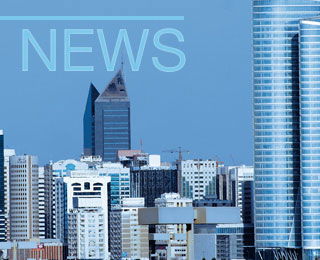PPC's South African cement sales volumes rose by seven per cent, while industry sales for the nine months ending June 2013 increased by 4.2 per cent. Strong volumes were recorded in the Gauteng and inland regions despite increased industrial action in these markets. Volumes in the coastal regions also recorded growth despite rising imports and a particularly wet winter season.
Imported cement, which is not subject to import duties and is excluded from national statistics, accounted for an estimated 7.6 per cent of national demand for the first six months of 2013. While cement imports have, to date, been limited primarily to KwaZulu-Natal, PPC notes that the effects are also being felt in the Eastern and Western Cape.
PPC's average cement selling price per tonne increased by four per cent during the financial year, while costs rose six per cent on a ZAR/t basis. Lower coal and maintenance costs assisted in keeping cost growth contained.
Slurry finishing mill No 4, the largest mill in the PPC group which was commissioned in 1974, was upgraded in May 2013 at a cost of ZAR100m (US$9.8m). This has improved mill reliability and production output, while reducing energy consumption by 15 per cent.
Meanwhile, PPCs cement volumes in Botswana contracted as construction and industrial demand fell, mainly as a result of government infrastructure projects being scaled back. Privately-funded developments in the new central business centre in Gaborone have started to pick up, which should stimulate demand.
Cement sales in Zimbabwe recorded double-digit growth for the period, with retail demand remaining the key driver. Increased competitor activity has, however, constrained cement price increases. The cost of production was well contained, aided by increased production output.
PPC's strategic objective 'to keep the home fires burning' was given further impetus by purchasing a majority stake in Safika Cement Holdings. Safika, with its well-known brand IDM, is a blended-cement producer manufacturing over 20m bags of cement per annum. This transaction is still subject to approval by the regulatory authorities.
In support of PPC's rest of Africa strategy, the company increased its investment in Ethiopia's Habesha Cement Company to 30 from 27 per cent at an additional cost of ZAR16m. Earlier in the year, the company bought a majority stake in Rwandas CIMERWA Ltd, which has a 100,000tpa cement-producing plant, and construction of an additional 0.6Mta facility is well advanced. Material progress has also been made with the project in the Democratic Republic of the Congo (DRC) and construction starts in the 1Q14.
Ketso Gordhan, CEO, said: "Our expansion strategy into the rest of the African continent has gained significant momentum, with identified projects progressing well in a number of countries. Cement sales in our home territories, particularly Zimbabwe and South Africa, have shown good growth which gives us the confidence and ability to execute our expansion strategy."
Exports to Mozambique were reduced by logistical challenges after flood damage to the rail line between South Africa and Maputo. Exports into the Tete region from our Zimbabwe operations have improved and plans to install a bulk-handling facility will further enhance efficiency.
Capital investment was ZAR964m (2012: ZAR609m), with ZAR385m being invested in the CIMERWA plant expansion. Gross debt has risen to ZAR4046m (2012: ZAR3585m) mainly as a result of the expansion strategy that is underway. PPC issued its inaugural bond in 2013, which was 4.6 times oversubscribed reflecting the markets confidence in our balance sheet management abilities. Net debt to EBITDA has increased to 1.5 times (2012: 1.4 times).
Group revenue increased 13 per cent to ZAR8316m (2012: ZAR7346m) due to higher cement sales in Zimbabwe and South Africa, the depreciation of the rand against both the US dollar and Botswana pula as well as the consolidation of CIMERWA (Rwanda) from February 2013. PPCs group cement sales volumes rose by seven per cent despite a relatively poor performance in Botswana and Mozambique.
Cost of sales of ZAR5546m (2012: ZAR4809m) rose 15 per cent mainly due to rising electricity and depreciation costs. Costs were also affected by sub-optimal sourcing from other PPC plants due to production issues at our Dwaalboom factory in the first quarter and upgrading of the main finishing mill at Slurry.
Normalised EBITDA increased eight per cent to ZAR2504m (2012: ZAR2327m) while operating profit before broad-based black economic empowerment (BBBEE) IFRS 2 charges, Zimbabwe indigenisation and restructuring expenses rose six per cent to ZAR1 981m (2012: ZAR1866m). The groups normalised EBITDA margin decreased to 30.1 per cent (2012: 31.7 per cent) due to cost growth, particularly administration and other operating expenses, exceeding revenue growth.
Lime sales were affected by major customers encountering operational interruptions. This led to a drop in burnt product sales of eight per cent while limestone sales reduced 15 per cent. Declining volumes have reduced EBITDA 14 per cent to ZAR162m(2012: ZAR188m).
Aggregates revenue grew 12 per cent to ZAR335m (2012: ZAR299m) as volume growth in Botswana partially offset marginally lower volumes in South Africa. An impairment charge of ZAR12m has been included in exceptional items after reviewing the projected financial performance of the Quarries of Botswana business.
Growth and confidence in the South African economy is critical to ensure improved demand for PPC's products. Due to modest growth, the domestic trading environment remains tough and highly competitive. PPC believes its strategies have positioned the company well in a challenging market.
With elections in Zimbabwe concluded, PPC expect continued growth in cement demand. The market has been dominated by retail clients and the company looks forward to increased infrastructure investment. PPC also continue to monitor the cement market in Botswana and anticipate that government spending on infrastructure will gradually begin to improve.
PPC remain confident about prospects for strong growth in the rest of Africa. PPC believes it is on track to meet its strategic objective of generating 40 per cent of its revenues from the rest of the continent by 2017.

Power Cement reports positive 3Q and 9MFY24-25 results
Pakistan-based Power Cement Ltd posted PKR7.182bn (US$52.5m) in revenue for the quarter ended ...